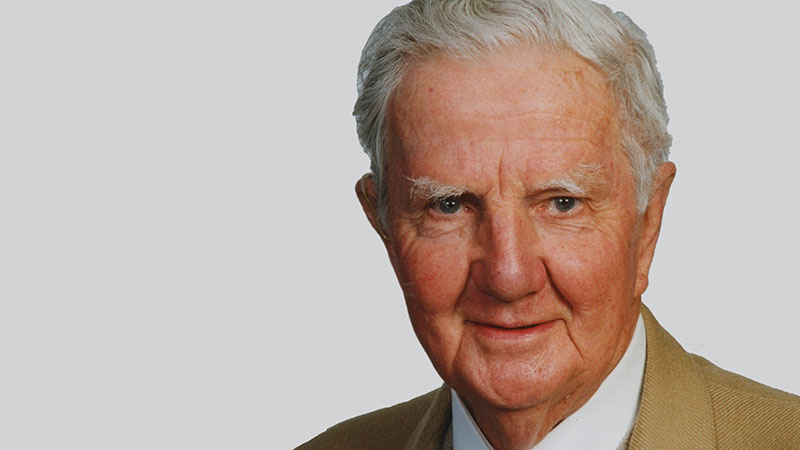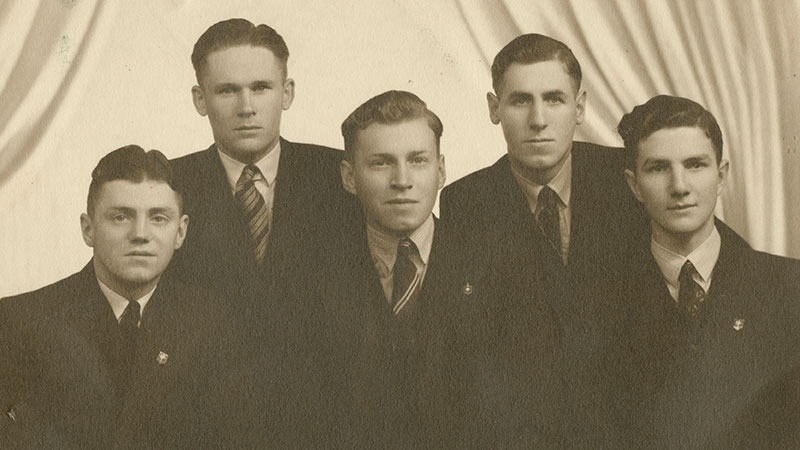Dr Grope: a model of faith in leadership
Rev Dr Les Grope ‘modelled what a leader should be’ according to those who succeeded him as head of the Lutheran Church of Australia (LCA).
LCA President Emeritus Dr Grope, who served in the role now known as LCA bishop from 1972 until his retirement in 1987, died on 28 January in Adelaide, aged 97.
Dr Lance Steicke, who led the church as president after Dr Grope, until his retirement in 2000, said the LCA’s leaders were ‘a gift of God to the church’.
‘Dr Les, as the second president of the LCA, was God’s gift to the church in 1972 and for the subsequent 15 years’, Dr Steicke said.
‘I personally am indebted to him for modelling what a leader should be.
‘I particularly appreciated his concern for theology, interchurch relations and worship, but that is not to underestimate his concern for Aboriginal ministries and his role as a pastor of the church.’
Current LCA Bishop John Henderson said Dr Grope’s thinking had ‘inspired’ him while he was a student preparing to enter the ministry.
‘As only the second president of the Lutheran Church of Australia, Dr Grope was intent on moving the newly united church into giving the best witness to the gospel it possibly could in the late 20th century’, Bishop Henderson said.
‘He saw a church which, in too many ways, had turned inwards to itself, either in a legitimate search for gospel purity or in the illegitimate attempt to a create a closed and virtuous circle within.
‘In a 1980 article published in Lutheran Men, Dr Grope called this closed circle a “ghetto” and claimed that a ghetto mentality was perhaps driving the LCA in unhealthy directions. Giving many examples to back up his observation, he encouraged the LCA to find the right balance between upholding its confessional faith and moving out into to the world in fellowship with other Christians.
‘As a student vicar at the time, Dr Grope’s thinking inspired me and convinced me that the LCA is more than the sum of its parts. We have an immense treasure, and when released, the potential to do a power of good for others and the kingdom of God.
‘The challenge Dr Grope saw in the 1980s is still, to a large extent, the challenge of the LCA today. While we have made great progress in some ecumenical spheres, we still experience strong impulses to pull up the drawbridge and keep this treasure to ourselves. Nothing is more certain that, if we do this, we will lose the treasure itself.
‘The treasure of the gospel is to be shared, not stored up for our own use, and Dr Grope knew that so well in his leadership of our church.
‘I pray that, as we mourn his passing, the legacy he leaves will inspire us as a church to let our confessional light shine for Jesus, and take up the challenge Dr Grope made as the new decade dawned in 1980 on the 400th anniversary of the Book of Concord: “Let this then be our resolve as we begin this new decade, to make every endeavour to grow in grace and in the knowledge of our Lord Jesus Christ. Thus will we be equipped to be better witnesses of the gospel in our community and to work in a God-pleasing way toward a true unity in the church of Jesus Christ”.’
Pastor Kevin Schmidt, who was Secretary of the Church from 1984 to 1991, also said Dr Grope had been an outward-looking leader.
‘He entertained visiting Lutheran Church leaders from overseas in his home and developed good relations with the Lutheran World Federation, especially in the South-East Asian region’, Pastor Schmidt said. ‘He helped give the LCA give a world-wide and ecumenical flavour. However, he also kept in close contact with the church’s districts, visiting them annually.’
Dr Grope’s funeral was held on 6 February at St Stephen’s Adelaide. Bishop Henderson preached on the text Philippians 1:21. ‘Today he has deliberately sent us these words as his funeral text, “For to me, to live is Christ and to die is gain”’, Bishop Henderson said. ‘”For me, to live is Christ” … For the true value of a human life we need to know not its circumference but its centre. Les wants us to know that a life with Christ at its centre has been a life worth living.’
Dr Grope is survived by his sons Andrew and Peter, their partners Bernadette and Anna, and one grandchild, Louis.
A life ‘with Christ at the centre’
Leslie Bernhard Grope was born at Stockwell, South Australia, on 19 December 1920, as the son of George Bernhard Grope and his wife Alwine Meta (nee Polst). He was baptised and confirmed in St Thomas Lutheran Church at Stockwell.
After primary school, he attended Nuriootpa Higher Primary and High School. He then spent two years at Immanuel College, North Adelaide, in preparation for theological studies at Immanuel Seminary. He graduated in 1943 and was ordained as pastor of the Lutheran church in 1944.
Pastor Grope was assigned to the church’s Queensland District and was installed in the North Coast Home Mission Field, which included churches and preaching places at Gympie, lmbil, Pomona, Nambour, Caloundra, Nitta, Wamuran, and Caboolture.
He married Ruth Rechner on 13 October 1945.
During his seven years of service at the North Coast Home Mission Field, Good Shepherd church was built at Caboolture by voluntary labour and Pastor Grope was elected onto the executive of the Lutheran Youth Association of Queensland. He was instrumental in the purchase of property at Coolum for use as a youth camp, which today is known as Luther Heights.
Pastor Grope’s second parish was at Highfields, near Toowoomba on the Darling Downs. There he was also involved with procuring land for a youth camp, known as Koojareewon.
In 1957, he accepted a call to St Paul’s Toowoomba, where he served for 10 years. Before his ministry there, he and his wife Ruth spent five months in America. During this visit, Pastor Grope attended the Lutheran World Assembly at Minneapolis and on-the-field studies in evangelism known as ‘Area Missions’, which he later introduced in Australia.
On the churchwide front, Pastor Grope served as the executive secretary of the Lutheran Youth Association of Australia, was secretary and then vice-president of the Queensland District of the church, and was a member of the committee which produced the current hymnbook. As chair of the Suomi Conference, he was also involved in the Finnish ministry throughout Australia and New Zealand.
In 1967, Pastor Grope accepted a call to St Stephen’s Adelaide and organised the first Sunday evening services for students in 1970.
He was then president of the LCA’s South Australia District from 1970, before being elected to the role of president of the Lutheran Church of Australia in 1972.
During his presidency, the church began dialogue with the Roman Catholic Church, followed by dialogues with other mainline churches.
Other notable changes in the LCA during his tenure included:
• The LCA’s Board for Congregational Life was established in 1975
• A large growth in Lutheran schools in Australia across the 1970s and 1980s
• By 1981, women were officially given the right to vote at General Synod and this became a reality in 1984
• Formal handover of Finke River Mission land to traditional owners 2 June 1982
• Lutheran Hour became ‘Australianised’, with the Face to Face program starting in 1983
Pastor Grope was conferred with an honorary Doctor of Divinity degree by Concordia Seminary, St Louis in the USA, in 1973. In 1977 the Australian Government recognised him with a Bicentennial Award. He was also made a Commander of the Order of the White Rose, by the Republic of Finland in 1988, and received the Member of the Order of Australia (AM) honour for service to religion in 1989.
After his retirement from the ministry, Dr Grope lived in Tanunda, in South Australia’s Barossa Valley, and then in suburban Adelaide. Ruth Grope died in 1988.
During his ministry, Dr Grope wrote devotional books and a hymnbook concordance, as well as translating a number of Luther’s writings. He also produced the cassette tapes Bells of the Barossa and Faith of our Fathers. During his retirement, he prepared a booklet about his hometown of Stockwell.
READ MORE STORIES ABOUT obituaries; presidents/bishops



